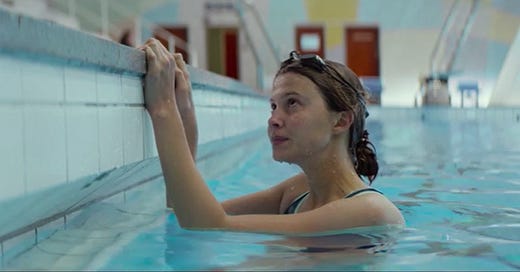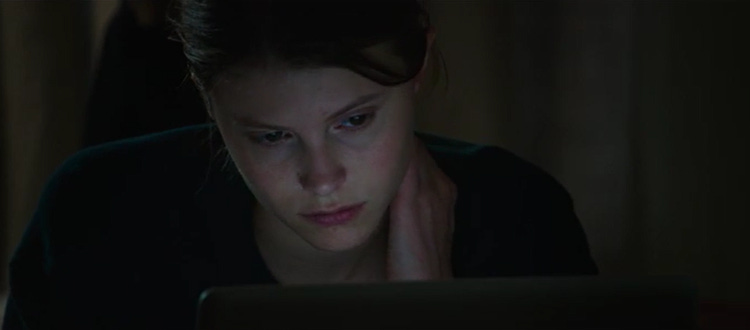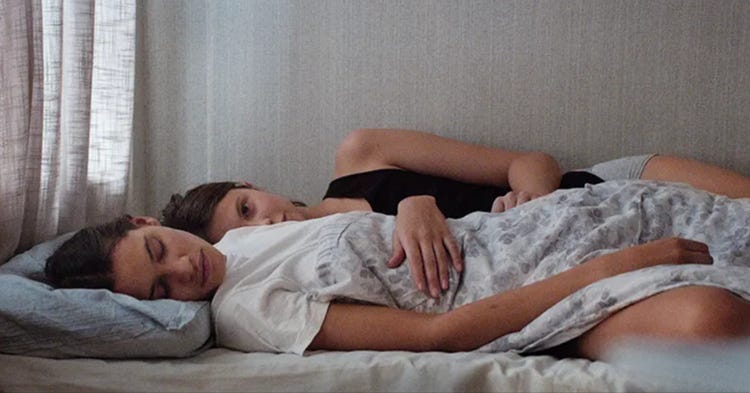Directed by: Joachim Trier
Written by: Eskil Vogt and Joachim Trier
The primary message behind Thelma is not at all subtle. It’s not unusual for horror/thriller films to use monsters or supernatural powers as a metaphor for underlying emotional trauma – sexual repression, anger, abuse. These themes radiate throughout Thelma, but just because superstar Norwegian director Joachim Trier is relying on a reasonably well-worn trope, doesn’t mean that the film is at all predictable or the lesser for it.
Thelma (the shockingly talented Eili Harboe) has moved away from her strict, religious household to live alone at University, experiencing many normal things for the first time – alcohol, parties, even friends. She finds herself drawn to Anja (Kaya Wilkins), a bisexual classmate who returns her interest. Thelma is thoroughly repressed, and her extreme reaction to her own burgeoning sexuality begins to trigger episodes of a psychokinetic power that’s been buried since she was a girl.
As Thelma moves closer to achieving her desires, such as kissing the girl, partying with her friends, drinking alcohol or taking drugs, her powers continue to manifest in ways that shock her to her core, and disturb the already-shaky balance of her sanity.
Thelma tries to work out what’s happening to her because she suffers what initially look like epileptic fits, but quickly escalate into inexplicable events. It’s obvious that Thelma is making these things happen. While being diagnosed at a clinic without her parents’ knowledge, she discovers her long-dead grandmother is still alive in a nursing home, forced by her own son into a drug regimen that keeps her catatonic. Thelma suspects her quiet, religious family may not be as virtuous as they appear.
Trier has a remarkable way of building scenes to maximise their claustrophobia. We need to be haunted the way Thelma is haunted, and see potential threats even in the ordinary. In the opening, we see a young girl and her father on a hunting trip, where we wait for her father to pull the trigger and kill the hapless deer. Only he doesn’t, he turns and points the gun at Thelma’s head without her knowing, but he can’t pull the trigger.
That disturbing sequence lingers over everything. It positions her parents as an unknown threat. Every phone call to check her schedule or what she’s having for dinner seems that much more oppressive. Every attempt to curb her instincts or control her actions feels strange. As Thelma lays on her apartment floor with her head on her father’s shoulder for comfort, we can’t help feeling a creeping sense of dread.
With death and destruction lingering over her, Thelma feels like a ghost everywhere she goes. The only times she feels real are when she’s with Anja or in the water, when just for a moment her true feelings, instincts and physicality are being let out to play. Horrifyingly though, the result of each interaction with Anja is more fear, repression, fits, and weird occurrences.
The real Thelma is trying to get out. There’s so much happening inside her she’s literally about to burst. Finally, when she can’t take it anymore, her reality fractures. She does the only thing she can think of to ease her pain, she runs back to her faith, and physically to her parents, where all their secrets come tumbling out.
There are some truly creepy sequences – no blood or gore or anything specifically monstrous, but Trier builds horror in the most delicate of ways, by messing with our heads just as Thelma’s head is being messed with by the reaction of her paranormal powers to both her oppressive present and memories of her past. The film never leaves her perspective, so we wonder just how much of what we are seeing we can trust.
Sexuality in Thelma plays a key role, both in the heroine’s slow spiral into darkness, and for any hope of survival. Trier asks a very literal question – if we hide pieces of ourselves, if we allow other people to suppress the very essence of what makes us who we are, how will the truth we crave eventually manifest itself? Will it fly outwards and destroy the things we love, or will it turn inwards and destroy our souls or sanity?
By making sexual repression physically tangible and dangerous, as queer people Trier cinematically taunts us with our worst nightmares. It's moving, stylish, terrifying, and nuanced filmmaking done with exquisite skill.







